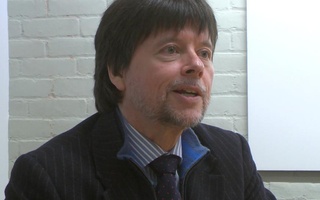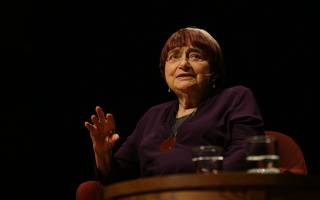Award-winning documentary filmmaker, producer, and screenwriter Helen Whitney will give three speeches at Memorial Church for this year’s William Belden Noble Lectures series.
Whitney, who has written, produced, and directed more than a dozen documentaries, said that each installment of the lectures series will focus on one or two of her most controversial and inspiring films.
“Each night, I will discuss and present excerpts from my films covering different periods of my professional life,” Whitney said. “The bright thread uniting all of my work is my passionate interest in religious experience and my fascination in the lives of outsiders.”
“A life in film is a remarkable learning experience,” Whitney added. “It allows one to enter exotic landscapes rarely seen by civilians and to meet fascinating people. Inevitably, it broadens and deepens one’s moral and intellectual education.”
Whitney said that while her work, including a documentary on monks’ lives in monasteries and a biography of Pope John Paul II, focuses mostly on religious topics, she is also interested in depicting the challenges faced by marginalized groups of people. Her documentaries have covered topics ranging from gang violence to homosexuality to Mormonism.
Whitney said that her presentations at Memorial Church will start at the beginning of her career and continue chronologically.
“The lectures will cover my 40-year journey through film, focusing on my passionate interest in outsiders and coming to understand what these people have to teach us if we just listen,” she said.
Whitney will also discuss controversies which her works have sparked.
“My documentary ‘Youth Terror: The View from Behind the Gun’ explored the roots of juvenile violence. A number of cities throughout America refused to air it because of its graphic language and its scenes of violence,” Whitney said.
Whitney had embarked on a career n academia, completing a masters degree in Victorian literature at the University of Chicago, before she experienced what she described as “a sudden unexpected call to film.”
That summons was sparked by an encounter with Fred Freed, an ABC news executive who became a mentor to Whitney.
“[Freed] convinced me to put my plans aside for a year and go on the road with him as his researcher,” Whitney recalled. After that, she was hooked on filmmaking.
Epps Fellow at Memorial Church Nathaniel P. Katz said that he believes Whitney will bring a unique perspective to the lecture series as the only filmmaker who has participated in the series to date.
“This is a 21st-century approach and reflection of how religion is thought of, and it takes advantage of film and media and different forms of story-telling, which are very much in line with how religion is lived out today,” Katz said. “I think people who come will find themselves challenged intellectually, spiritually, and practically.”
Whitney said that she hopes that any aspiring documentary makers in the audience will walk away with a better understanding of the challenges and rewards of a career in film.
“There are special challenges for a filmmaker exploring the spiritual landscape. How does one illuminate spiritual themes, for instance? These challenges are invigorating, and the life of the filmmaker grappling with them can be profoundly humanizing, offering rare insights into the human condition,” she said.
The William Belden Noble Lectures were established in 1898 to “illustrate and enforce the words of Jesus,” but the topics of the series are “believed to be as wide as the highest interests of humanity,” according to the description of the bequest that funds the series.
Whitney will speak next Monday, Tuesday, and Wednesday at Memorial Church.
—Staff writer Matthew M. Beck can be reached at mbeck@college.harvard.edu.
Read more in News
Liaison Program Connects Student Organizations to UCRecommended Articles
-
Ken Burns Speaks on JazzFilmmaker Ken Burns, a Grammy, Emmy and Peabody Award winner, defended his landmark new documentary "Jazz" at a panel discussion
-
Oliver Stone Speaks at Law SchoolOscar-winning director Oliver Stone offered a bleak and often apocalyptic picture of media and violence in the 20th century in
-
HFA Hosts Avant-Garde FilmmakerTony Conrad ’60 is an acclaimed and multitalented filmmaker, composer, and conceptual artist. Last weekend, the Harvard Film Archive (HFA)
-
 Ten Question with Ken L. Burns
Ten Question with Ken L. Burns -
 Agnès Varda’s Norton Lecture Tests the Boundaries of Genre
Agnès Varda’s Norton Lecture Tests the Boundaries of Genre












